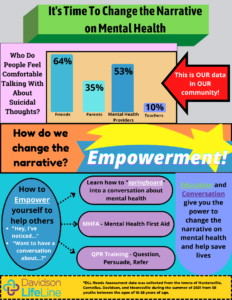
While people may recognize where support for mental health issues can be found, it is often more difficult to ask for help. Our study focused on youth in the LKN area between the ages of 15-24 years old. It found that while respondents could identify multiple sources of support in their lives, they often felt significantly less comfortable discussing their mental health struggles with those same sources (Benziger & Wipper, 2021). The majority of respondents felt that if they were experiencing suicidal thoughts they could discuss them with friends or a mental health provider. We found that fewer respondents felt comfortable talking with family, and even fewer would talk to school staff about these thoughts.
The table below shows a detailed breakdown of whom respondents would tell if they were experiencing suicidal thoughts. The results show that adolescents feel more comfortable talking to their friends first. While developmentally appropriate, that lack of openness reflects the stigma around mental health, and we need to change that narrative. Instead of relying on those experiencing mental health issues to come forward and ask for help, we can learn to be comfortable opening up the conversation and taking the initiative.
Knowing how to start a conversation about mental health and suicidal thoughts is a major way we can break down stigma. People naturally feel uncomfortable talking about something they do not know much about. This is why it’s important to empower ourselves to break down those walls and normalize the conversation about mental health. Some conversation starters are things like “I’ve noticed you haven’t seemed yourself lately…”, or “I’m wondering if you want to get together and have a conversation…”. This shows curiosity and begins to build a connection with the person who is struggling. It is also important to frequently make eye contact with that person, as it has been shown to be one of the most powerful ways to create a link between two people (Farroni et al., 2002). This can help ease the conversation about this difficult topic.
You can empower yourself through resources such as MHFA (Mental Health First Aid), QPR training (Question, Persuade, Refer), or by reading articles related to mental health. Together we can change the narrative by using our resources and empowering ourselves to be comfortable talking about mental health.

Sign up for Mental Health First Aid
September 12 AND 13, 6:00-8:30 both nights – virtual
Sign up for QPR
– 8/23 and 9/22 – 6-8:30p – free
Sign up at www.townofdavidson.org/dpr. These programs are no cost to you.
|
References: Benziger, A., Wipper, L. (2021). Davidson LifeLine Needs Assessment: Youth Mental Health [PowerPoint Slides]. https://docs.google.com/ Farroni, T., Csibra, G., Simion, F., & Johnson, M. H. (2002). Eye contact detection in humans from birth. Proceedings of the National Academy of Sciences, 99(14), 9602–9605. https://doi.org/10.1073/pnas. Lovato, N., & Gradisar, M. (2014). A meta-analysis and model of the relationship between sleep and depression in adolescents: Recommendations for future research and clinical practice. Sleep Medicine Reviews, 18(6), 521–529. doi:10.1016/j.smrv.2014.03. Meldrum, R. C., & Restivo, E. (2014). The behavioral and health consequences of sleep deprivation among U.S. high school students: Relative deprivation matters. Preventive Medicine, 63, 24–28. https://doi.org/10.1016/j. |
